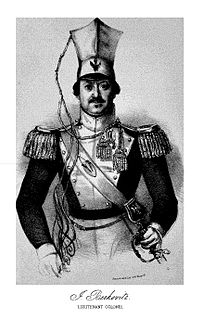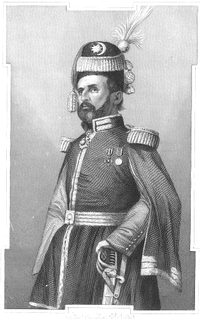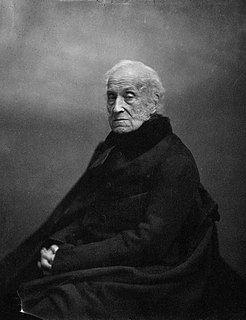 W
WFrançois Carlo Antommarchi was Napoleon's physician from 1818 to his death in 1821.
 W
WJózef Berkowicz also known as Joseph Berkovitz or Berkowitz was a Polish military officer of Jewish origin, the only son of Berek Joselewicz.
 W
WAlexandre Florian Joseph, Count Colonna-Walewski, was a Polish and French politician and diplomat.
 W
WMichał Czajkowski, also known in Turkey as Mehmet Sadyk Pasha, was a Polish writer and political émigré of distant Cossack heritage who worked both for the resurrection of Poland and also for the reestablishment of a Cossack state.
 W
WAdam Jerzy Czartoryski, in English known as Adam George Czartoryski, was a Polish nobleman, statesman, diplomat and author.
 W
WIgnacy Domeyko or Domejko, pseudonym: Żegota was a Polish geologist, mineralogist, educator, and founder of the University of Santiago, in Chile. Domeyko spent most of his life, and died, in his adopted country, Chile.
 W
WJózef Dwernicki was a General of Cavalry in the Polish Army, and a participant in the November Uprising (1830–1831).
 W
WTytus Adam Działyński was a Polish political activist and protector of arts and a Prussian politician.
 W
WAntoni Melchior Fijałkowski was the Archbishop Metropolitan of Warsaw and spiritual leader of the nation during the Partitions of Poland.
 W
WKajetan Garbiński (1796–1847) was a Polish mathematician and prominent professor at the University of Warsaw. Minister of religion and education in the revolutionary Polish National Government during the November Uprising in 1831.
 W
WFranciszek Ksawery Godebski was a Polish writer and journalist.
 W
WSeweryn Goszczyński was a Polish Romantic prose writer and poet.
 W
WStanislas Hernisz was a Polish freedom-fighter, journalist, physician, employee of the United States Department of State and sinologist of Jewish descent.
 W
WKarol Aleksander Boromeusz Hoffman was a Polish political writer, historian, lawyer and publisher.
 W
WAntoni Aleksander Iliński, also known as Iskender Pasha, was a Polish-Ottoman military officer and general. A Polish independence activist and insurgent, he took part in the independence struggles of Poles and Hungarians against the Austrian-Russian alliance. He converted to Islam in 1844 and subsequently served in various commanding posts in the Ottoman Army during the reign of Abdulmejid I (1839–1861) in Bosnia and Herzegovina, Danube, Crimea, Transcaucasia, and Baghdad. He was promoted to the rank of Pasha (General) during the Crimean War in 1855.
 W
WAlbert Félix Ignace Kazimirski or Albin de Biberstein was a French orientalist and Arabist of Polish origin, author of an Arabic-French dictionary and a number of Arab-French translations, including the Quran.
 W
WMichał Ambroży Kochanowski (1757–1832) was a Chamberlain of Stanisław August Poniatowski since 1778; deputy to the Great Sejm (1788–1792), councillor of Diplomatic Section of Provisional Temporary Council, member of the Supreme National Council during the Kościuszko Insurrection (1794), member of the government in the Duchy of Warsaw (1808–1815), senator, castellan and voivode in the Congress Poland since 1816, member of the Administrative Council during the November Uprising in 1831.
 W
WSzymon Konarski (1808–1839) was a 19th-century Polish-Lithuanian radical democratic politician and revolutionary, one of the leaders of the November Uprising of 1831. As a politician, he supported the radical idea of social and economic equality for all men, as well as the right of political and national liberty and self-governance. Konarski supported the idea of land reform in the form of parceling out aristocratic estates among the poor peasants, and opposed the clergy.
 W
WJózef Dominik Korwin-Kossakowski, was a Polish–Lithuanian statesman and military commander, a participant of Targowica Confederation and a colonel of the Polish Army. He used the Ślepowron coat of arms.
 W
WStanisław Egbert Koźmian was a Polish writer, poet and translator. He is now best known for translating the works of William Shakespeare into Polish.
 W
WJoachim Lelewel was a Polish historian, geographer, bibliographer, polyglot and politician.
 W
WKarol Libelt was a Polish philosopher, writer, political and social activist, social worker and liberal, nationalist politician, and president of the Poznań Society of Friends of Learning.
 W
WKarol Marcinkowski was a Polish physician, social activist in the Greater Poland region, supporter of the basic education programmes, organizer of the Scientific Help Society and the Poznań Bazar - the Polish mall in Poznań that included a hotel, meeting rooms, crafts and shops.
 W
WLudwik Adam Mierosławski was a Polish general, writer, poet, historian and political activist. Took part in the November Uprising of the 1830s, after its fall he emigrated to France, where he taught Slavic history and military theory. Chosen as a commander for the Greater Poland Uprising of 1846, he was taken prisoner early but amnestied during the Spring of Nations. In 1848 and 1849 he fought for the insurgents in Baden and in the Electorate of the Palatinate. Afterwards he returned to France; he also had contacts with Italian activists like Giuseppe Garibaldi. He also took part in the January Uprising in the 1860s, as the first of four dictators of the Uprising.
 W
WMaurycy Mochnacki was a Polish literary, theatre and music critic, publicist, journalist, pianist, historian and independence activist. One of the main theorists of Polish Romanticism. He joined the November Uprising in 1830 taking part in several battles for example at Stoczek, Ostrołęka, Grochów and Wawer. For that activity he was promoted to officer rank and awarded the War Order of Virtuti Militari, which is the highest Polish military decoration.
 W
WAugust Maximilian Myhrberg was a Finnish-Swedish military officer and revolutionary. After abandoning his studies at the Uppsala University, he pursued a military career by supporting the liberals in the Hundred Thousand Sons of Saint Louis revolution, the Greeks in the Greek War of Independence and the Polish rebels in the November Uprising. His adventures were mythologized in his native Sweden and his persona was idealized by late 19th century Finnish nationalists.
 W
WLeopold Niemirowski was a self-taught Polish painter; exiled to Siberia for his revolutionary activities.
 W
WBonawentura Niemojowski was a Polish lawyer, writer and politician. He was one of the leaders of Polish National Government during the November Uprising.
 W
WWincenty Niemojowski (1784-1834) was a Polish political activist in Congress Poland. Member of the Kalisz Opposition, later joined the revolutionary government during the November Uprising.
 W
WNapoleon Mateusz Tadeusz Orda was a Polish-Lithuanian musician, pianist, composer and artist, best known for numerous sketches of historical sites of the former Polish–Lithuanian Commonwealth.
 W
WJuliusz Konstanty Ordon was a participant of the Polish November Uprising in 1830–1831.
 W
WWladyslaw Tomasz Rawicz-Ostrowski (1790-1869) was a Polish nobleman (szlachcic), Count since 1798.
 W
WAntoni Norbert Patek was a Polish pioneer in watchmaking and a creator of the Patek Philippe & Co., one of the most famous Swiss watchmaker companies.
 W
WCountess Emilia Plater was a Polish–Lithuanian noblewoman and revolutionary from the lands of the partitioned Polish–Lithuanian Commonwealth. Raised in a patriotic tradition in Līksna near Daugavpils, she fought in the November Uprising of 1830–1831 against the Russian Empire. She raised a small unit, participated in several engagements in present-day Lithuania, and received the rank of captain in the Polish insurgent forces. When the main forces under the General Dezydery Chłapowski decided to cease fighting and cross into Prussia, Plater vowed to continue the fight and wanted to cross into Poland where the uprising was still ongoing. However, she fell ill and died.
 W
WGustaw Potworowski, count, was a Polish activist, founder of the Kasyno in Gostyń, activist of the Polish League.
 W
WKarol Dominik Przezdziecki (1782–1832) was a Polish count, born in Chornyi Ostriv.
 W
WEdward Jan Römer or, in Lithuanian, Edvardas Jonas Riomeris was a Polish writer, translator, social activist and painter. He was the father of the artists Alfred Izydor Römer, from his first marriage, to Anna Monvid-Belozor (1805–1834), and Edward Mateusz Römer, from his second marriage, to Anna's sister, Sophia (1817–1893). His father was the politician, Michał Józef Römer.
 W
WAlexander Rypinski was a Belarusian and Polish poet, translator and folklorist, participant in the November Uprising.
 W
WWacław Seweryn Rzewuski was a Polish explorer, poet, orientalist and horse expert.
 W
WPrince Roman Adam Stanisław Sanguszko (1800–1881) was a Polish aristocrat, patriot, political and social activist.
 W
WPrince Władysław Hieronim Sanguszko (1803–1870) was a Polish nobleman, landowner, conservative politician.
 W
WWalenty Stefański was a Polish bookseller, publisher, political activist and co-founder of the Polish League. He supported autonomy for Greater Poland during the Greater Poland Uprising of 1848 against Kingdom of Prussia, and was a member of the Polish National Committee (1848).
 W
WJanuary Suchodolski was a Polish painter and Army officer, and a member of the Imperial Academy of Arts.
 W
WLudwik Sztyrmer was a Polish novelist, literary critic and soldier.
 W
WAntonina Tomaszewska (1814–1883) was a Polish-Lithuanian noblewoman and rebel. She participated in the November Uprising against the Russian Empire; her actions during the revolt led to her being cited as an example of female heroism in the Polish independence movement.
 W
WJan Józef Tyssowski, born in Tarnów, Poland, was a Dictator of the Republic of Kraków during the failed 1846 uprising. He was a Polish intellectual and activist during Poland's rebellions against its occupying powers. He studied philosophy and law at the University of Lwow. After the failed 1831 November Uprising, Russian authorities prohibited his return to Lwow, and he went study at the University of Vienna. He was a Polish political organizer in Galicia with Ludwik Mieroslawski, and was active within the aristocracy and insurrectionist movement. In 1846, Krakow revolted against the Austrians and they withdrew, leaving the Polish-controlled Republic of Krakow in Tyssowski's hands. The government had originally been established as a triumvirate between Tyssowski and two others, but personal differences led Tyssowski to take control. Intending a "classless society", he declared universal suffrage, emancipation of the peasantry, and the discontinuation of rents for peasants. The Republic attempted to expand into neighboring rural areas, and sympathetic peasants did join the cause, but these units were defeated by much larger Austrian armies, which also had broad support among the peasants. On March 3, Russia occupied the city and passed it back to Austria. Roughly 1,200 people were arrested and approximately 100 were imprisoned in the Kufstein Fortress. The Austrian Empire captured Tyssowski who surrendered to the occupying forces, and allowed him to emigrate.
 W
WFelix Wierzbicki was a Polish-American veteran of the November 1830 Uprising, physician, soldier, traveler, and writer.
 W
WJózef Wysocki was a Polish general, soldier in the November Uprising of 1830, the Hungarian Revolution of 1848 and the January Uprising of 1863.
 W
WPiotr Wysocki, was a Polish lieutenant and leader of the Polish conspiracy against Russian Tsar Nicolas I. Nobleman (szlachcic) of Odrowąż Coat of Arms, he raised military insurgents on 29 November 1830, starting the November Uprising against Russia. In 1831 he was sentenced to death by Russians, but his sentence was commuted to a 20 years exile in Siberia.
 W
WJózef Bohdan Zaleski was a Polish Romantic poet. A friend of Adam Mickiewicz, Zaleski founded the "Ukrainian poetic school."
 W
WJózef Zaliwski of Junosza coat of arms was a Polish pułkownik of Kingdom of Poland, independence activist.
 W
WTeofil Żebrawski (1800–1887) was a Polish mathematician, bibliographer, architect, biologist, archeologist, cartographer and geodesist; an erudite and polymath. Pioneer of the modern Polish mathematical bibliography.